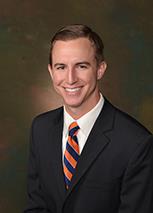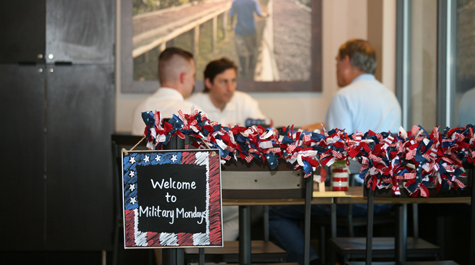Military Mondays
 This story originally appeared in the November 2016 edition of Williamsburg’s Next Door Neighbors. It is reprinted here with permission.
This story originally appeared in the November 2016 edition of Williamsburg’s Next Door Neighbors. It is reprinted here with permission.
Second Lieutenant Austin Swink stands out among his fellow students at William & Mary Law School. He’s a Marine, even in civvies. It could be the erect posture, his closecropped hair, or the shirt neatly tucked into his khakis, but the snappy “Yes, Ma’am!” reply to my questions is proof of military discipline. The engaging young man personifies founder Thomas Jefferson’s 1779 goal of educating citizen lawyers prepared both to lead and serve a newly born nation. How better to serve one’s country than by helping military veterans receive benefits they’ve earned in its defense? Austin Swink does that through a program known as Military Mondays.
Austin took a year off after graduating from University of Florida to work in politics, and then came to Williamsburg two years ago for law school. “I’ll graduate in May,” Austin says. “I attended Officer Candidate School for ten weeks at Quantico this past summer and was commissioned on 6 August. It was a year-long process from signing up to commission, during which I was working here as part of our Puller Clinic.”
The Lewis B. Puller, Jr. Veterans Benefits Clinic, founded in 2008, initiated the innovative Military Mondays program last year. It was recently given the 2016 American Bar Association’s prestigious Brown Select Award, given in recognition of services rendered to the U.S. Armed Forces in partnership with coffee powerhouse, Starbucks®.
The seed of this legal outreach program was planted when Patricia Roberts, Clinical Professor of Law and Director of Clinical Programs at W&M, read a Time magazine story which mentioned that more veterans live near a Starbucks than they do a Veteran’s Administration facility. She contacted Starbucks headquarters with her idea, and they put her in touch with Unique Turner, owner of a Williamsburg franchise who is from a military family. Originally launched as Claims Over Coffee, it’s designed to serve the Hampton Roads area’s 100,000 active-duty and reserve personnel, as well as thousands of veterans. Military Mondays is now being used as a pilot program and has been replicated nationwide.
Austin looks forward to the twice-monthly sessions. He and other law students meet clients by appointment at the McLaw’s Circle Starbucks, a venue that’s accessible, familiar and comfortable to everyone, for one-on-one free legal advice and counsel. “We operate under the close cooperation and oversight of our professors,” Austin says, “but we’re able to take what we’ve learned and help these men and women navigate what is, unfortunately, the complicated process of applying for disability compensation benefits, and to answer other basic legal questions they may have. It develops our client skills while fulfilling a need within the community. They don’t have to go hire an attorney, and we can help them get the benefits they’ve earned and deserve. For us, there’s something so satisfying about getting to work with people on a personal basis.”
Dramatic results have come from the program, thanks largely to the enthusiasm the law students bring to their task. They have the passion, skills and time to invest in their clients’ needs. Though under the supervision of their professors who are licensed attorneys, it’s actually the students who are doing the research, writing the briefs, and contacting the Veterans Administration (VA).
“One great story I can share without breaching attorney/client privilege,” Austin says, “involves an Air Force veteran with Parkinson’s disease who had been stationed in Thailand for a year during the Vietnam conflict. “Everyone who served on the ground in Vietnam is assumed to have been exposed to harmful chemicals, but not in Thailand. This airman’s hootch, or barracks, was open-air, and dust would blow through. He’d taken pictures of his hootch and his work on the flight line near vegetation which had been killed off with toxic herbicides.” His disability claim was denied until a student’s research uncovered an old official map of the base which showed his close proximity to affected places. “That, plus the vet’s photographs which his wife had saved, proved that Agent Orange was used to establish a perimeter around the base and he had been exposed to it daily. His claim was accepted,” he says with satisfaction.
Austin expects that he will be able to continue to serve clients well on his current military career track. “I credit Adjunct Professor Aniela Szymanski’s example for my transformation from law student to Marine,” he says. She serves as a major in the Marine Corps Reserve, and observing her career caused Austin to see a side of the law that interested him and which he wanted to explore. “After graduation, I’m contracted to complete the same training that all Marine officers go through, which means six months at Quantico for The Basic School, or TBS. I’ll then go to Naval Justice School in Rhode Island for ten weeks of further study with other Marine, Navy and Coast Guard officers, then into the Judge Advocate General (JAG) Corps as a JAG officer.”
One of the attractions for Austin was the expectation that he’ll be able to work directly with clients quickly after graduation, while his classmates will most likely be logging many long hours as research assistants.
“In the first two years, Marines typically concentrate on criminal law within the military justice system, whether it is prosecution or defense, but I’ll also get a chance to continue what I’ve been doing with veterans, which is legal services and support,” Austin says.“Marines, like anybody else, need help with property issues, wills, adoptions and divorces. I can help take that load off of them by offering free legal support as part of their military benefits.”
There is no precedent in Austin’s immediate family for careers in law or the military. “I was in fourth grade when the 9/11 attacks came, and that made a big impact on me. As I grew up, I realized I wanted to serve and protect my country and honor the sacrifices others had made for me. I liked to stay fit and enjoy travel, so why wouldn’t I want to join the military? It felt selfish not to consider it.”
Austin’s wife, Chelsea, an Orlando native whom he met when they were freshmen at college, is also excited about military life. “We got married in January of 2015 and don’t have kids yet, which will make it easier to move around,” Austin says. Chelsea works from home by Internet for a company in Orlando, so her job is mobile. She’s also an emergency room technician at Sentara Williamsburg and volunteers as an EMT with the fire department. “She’s hoping to eventually be a nurse-practitioner,” says her proud husband. “The great thing about a medical career is that wherever you go, there’s always a demand for your services.”
Service seems to be a shared goal that will eventually become their family legacy. The desire to help others is what drives both careers. Austin’s service starts now, in a booth at Starbucks on a Monday afternoon, with a grande black coffee and a yellow legal pad at hand, ready for his next client. “I realized I could serve best by being an advocate for those who go out and put themselves in harm’s way,” he says. “Being a lawyer and a Marine officer isn’t about me, it’s about them.”
The views expressed are the personal opinions of Austin Swink and do not reflect the official policy or position of the United States Marine Corps, Department of Defense, or the U.S. Government.
